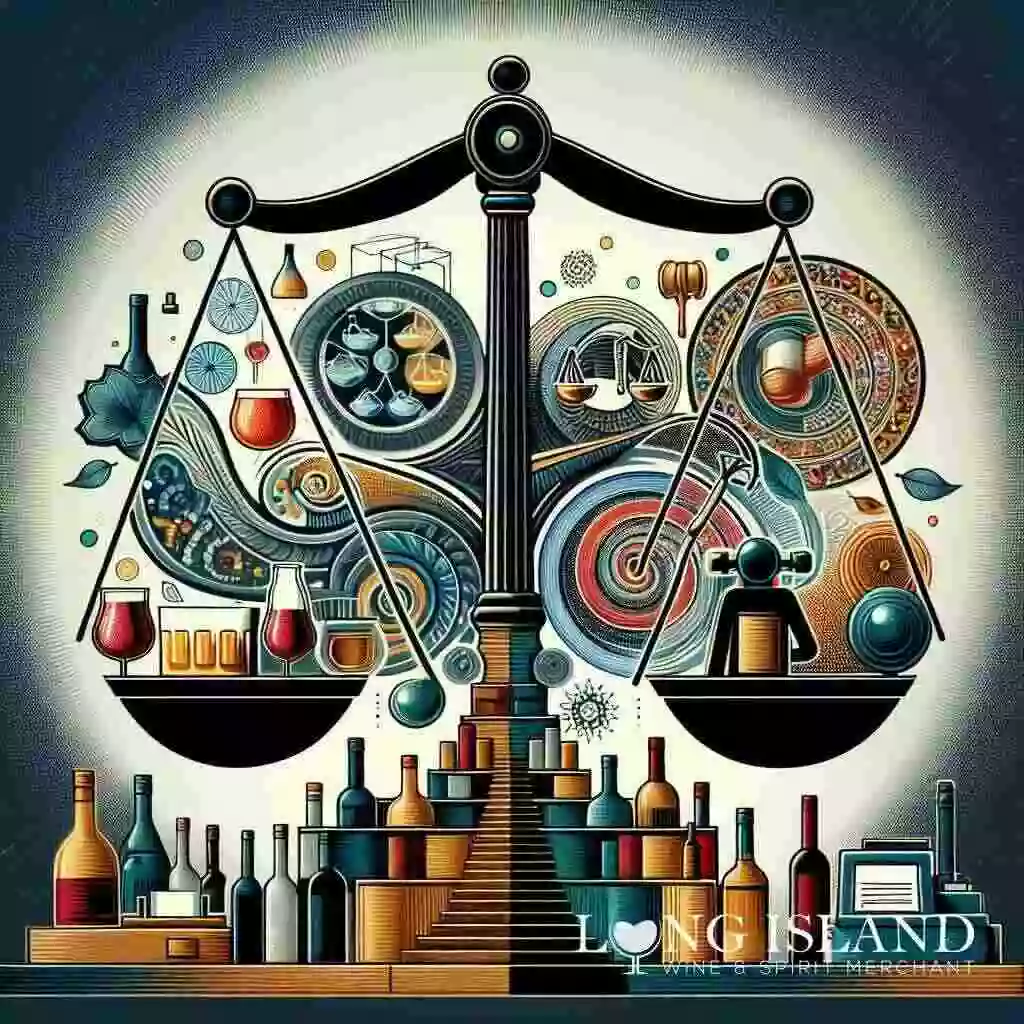
How Old Do You Have to Be to Work at a Liquor Store?
May 16, 2024
Introduction to Working in the Alcohol Retail Industry
Understanding the Liquor Store Landscape
The alcohol retail industry is a dynamic and vital part of the economy, offering a diverse range of employment opportunities across various roles. Working within this sector provides an insightful glance into the intricacies of selling alcoholic beverages, from understanding the vast array of products like wine, beer, spirits, and more to mastering the legalities surrounding alcohol sales. Liquor stores, ranging from local boutiques to large chains, serve as key access points for consumers seeking both common and unique alcoholic beverages. The landscape of alcohol retail requires a workforce knowledgeable in inventory management, customer service, and strict adherence to legal age requirements for sales.
Benefits of Working at a Liquor Store
Working at a liquor store comes with numerous benefits, not just in terms of monetary compensation, but also in the wealth of knowledge and skills that employees gain. Staff members become well-versed in product knowledge, encompassing everything from the fermentation process in winemaking explored to the art of distilling spirits. Moreover, employees develop strong customer service skills, learning how to interact with a diverse clientele and provide recommendations that suit different tastes and occasions. Additionally, working in a liquor store can lead to opportunities for career advancement within the industry, from management roles to specialized positions focusing on rare and fine spirits.
The Importance of Age Regulations in Alcohol Retail
Age regulations in alcohol retail are of paramount importance, serving as a critical measure to ensure the responsible sale and consumption of alcoholic beverages. These laws help to prevent underage drinking by setting legal age limits for the purchase and sale of alcohol. The minimum age for employment in liquor stores varies by state, reflecting the local legal framework governing alcohol sales. For example, in Long Island, New York, individuals must be at least 18 years of age to work in a liquor store, whereas some states may have higher age requirements. This aspect of the alcohol retail industry highlights the role of liquor stores in promoting public health and safety through compliance with state and federal regulations.
Understanding Legal Age Requirements for Liquor Store Employment
Federal vs. State Regulations on Liquor Store Employment
The legal age requirements for employment in liquor stores are primarily governed by state law, but it’s important to understand how these regulations interact with federal stipulations. Federally, there’s no minimum age explicitly set for selling alcohol for off-premise consumption, which includes liquor stores. However, the Federal government requires states to comply with certain regulations to receive federal funding for highways. This indirectly influences state laws, including those related to employment in settings where alcohol is sold. To offer a comprehensive perspective on employment in liquor stores, it’s crucial for employers and potential employees alike to navigate both state and federal guidelines carefully. This ensures adherence to regulations that promote responsible alcohol sales while also maximizing job opportunities within the legal parameters.
State-Specific Age Requirements
In the intricate landscape of alcohol retail, state-specific age requirements play a critical role in defining eligibility for employment within liquor stores. These regulations are as diverse as the states themselves, reflective of local attitudes toward alcohol sales and youth employment. For instance, Long Island, New York, mandates a minimum age of 18 for individuals seeking employment in liquor stores. Contrary to this, North Dakota enforces a stricter age requirement, setting the minimum at 21. This disparity underscores the necessity for prospective employees and store operators to have a thorough understanding of the specific legal framework governing their state. Such knowledge not only aids in compliance with local laws but also illuminates the broader spectrum of employment opportunities available for young workers in the alcohol retail industry. For more in-depth insights into state-specific regulations, Liquor Store Open offers essential guidance and resources.
Legal Working Age for Liquor Sales across the United States
Navigating the legal working age for liquor sales across the United States requires an appreciation for the mosaic of legislation that varies significantly from one state to another. This legal patchwork results in a landscape where adjacent states can have markedly different age requirements for the same job role within a liquor store. Understanding these distinctions is not only vital for compliance but also critical for those interested in exploring employment opportunities in the alcohol retail space. It sheds light on potential interstate differences that could impact an individual’s job search or a company’s hiring strategy. For businesses like Liquor Store Open, which operates within the nuanced confines of state law while also catering to a nationwide audience through online sales, staying informed about these regulations is essential for smooth operations and legal compliance.
Exploring the Age Criteria for Various Roles within Liquor Stores
Cashier and Front-of-House Positions
When considering employment at a liquor store such as Liquor Store Open, one of the most common starting positions available is that of a cashier or other front-of-house roles. These positions are crucial for the daily operation of the store, requiring direct interaction with customers, handling monetary transactions, and ensuring compliance with local alcohol sales laws. The minimum age for these roles typically aligns with the state’s legal age for handling and selling alcohol, which, as mentioned before, can vary. In Long Island, New York, where Liquor Store Open operates, individuals must be at least 18 years old to work these positions. This age requirement ensures that employees are legally able to handle alcohol, which is an inherent part of the job. Understanding and adhering to age verification protocols is a critical responsibility for cashiers, emphasizing the necessity of maturity and attention to detail in these roles.
Stocking and Warehouse Roles
Beyond the front-of-house operations, liquor stores also offer stocking and warehouse positions, which involve receiving shipments, organizing inventory, and ensuring products are displayed appropriately throughout the store. These roles may have different age requirements compared to those that involve direct alcohol sales. In some instances, state regulations may allow individuals younger than the legal age for alcohol sales to work in these capacities, provided they do not engage in the actual sale of alcoholic beverages. This distinction allows liquor stores greater flexibility in hiring for back-of-house operations. Nonetheless, it is imperative for employers to understand and strictly adhere to their state’s laws to avoid legal complications. The age criteria for these roles play a significant part in the recruitment process, influencing how liquor stores like Liquor Store Open structure their teams.
Age Requirement for Management Positions
Management positions within liquor stores require a higher level of responsibility, encompassing not only the operational aspects of the business but also the legal compliance with alcohol sales regulations. As such, the age requirement for management roles is often stricter, with many states and employers preferring or requiring candidates to be at least 21 years old. This age criterion ensures that managers have the legal authority to oversee all aspects of alcohol sales, including the supervision of younger employees who may be legally restricted from certain duties. Furthermore, managerial roles demand a comprehensive understanding of the alcohol retail industry, including inventory management, customer service excellence, and adherence to local and federal laws regarding alcohol sales. For companies like Liquor Store Open, managers play an integral role in maintaining the establishment’s reputation for compliance and service quality, making the age requirement a key factor in hiring decisions.
Age Verification and Compliance
The Role of Employers in Verifying Age
Ensuring compliance with state regulations starts with rigorous age verification processes in the liquor store environment. Employers at establishments like Liquor Store Open are tasked with the pivotal role of verifying the age of potential employees to adhere to legal working age mandates. This not only involves reviewing government-issued identification documents during the hiring process but also implementing ongoing checks to maintain compliance. Given the serious repercussions of non-compliance, store operators invest in training their management teams on the latest verification techniques and legal requirements. The goal is to create a responsible retail environment that promotes safety and legal adherence, ensuring that employees engaged in the sale and handling of alcohol meet the mandated age criteria set forth by both state and federal laws.
Training and Certification for Selling Alcohol
Training and certification programs are essential tools for liquor stores in promoting responsible alcohol sales. Programs like training certification for selling alcohol on Long Island provide employees with the necessary knowledge and skills to effectively comply with legal age restrictions and handle alcohol sales responsibly. These certifications cover a range of topics, including how to spot fake IDs, understanding state-specific alcohol sales laws, and techniques for refusing sales to underage customers. Liquor Store Open, by investing in such training for its staff, ensures a team that is not only knowledgeable about the products they sell but also well-versed in the legalities and ethical considerations surrounding alcohol sales. This commitment to education and adherence to compliance standards helps in fostering a safe and lawful retail environment.
Consequences of Non-Compliance for Employers and Employees
The consequences of failing to comply with age verification and employment laws can be severe for both employers and employees within the liquor store industry. Non-compliance can lead to legal repercussions including fines, license suspensions, or even permanent business closure for retailers like Liquor Store Open. For employees, working in violation of age requirement laws can result in termination, legal penalties, and difficulties in securing future employment in the retail sector. These potential outcomes underline the importance of rigorous compliance with age verification policies and the active role employers must take in ensuring all staff members adhere to the legal requirements. To mitigate these risks, ongoing education, regular audits, and a culture of transparency and accountability are imperative within the liquor retail environment, underscoring the collective responsibility to uphold the law and promote responsible alcohol sales practices.
State Laws and Their Impact on Hiring Practices in Liquor Stores
State regulations have a profound impact on the operational aspects of liquor stores, especially when it comes to hiring practices. Navigating these laws is crucial for employers to ensure they maintain compliance while providing opportunities for employment within their communities.
Overview of State Regulations on Age Requirements
The diversity of state laws concerning age requirements for working in liquor stores showcases the complexity of managing a business within the alcohol retail industry. While some states mandate a minimum age of 21 for employees handling or selling alcohol due to the drinking age restriction, others permit younger individuals, typically 18 and above, to work in these establishments under certain conditions. This variance is partly due to how each state interprets the prevention of underage drinking and its strategies for enforcing these laws. For instance, in Long Island, New York, the law allows individuals who are at least 18 to be employed in liquor stores, such as Long Island Wine & Spirit Merchant, enabling a broader spectrum of the community to partake in retail opportunities within the alcohol sector.
How State Laws Affect Liquor Store Hiring Policies
The impact of state laws on liquor store hiring policies is multifaceted, necessitating a flexible approach to recruitment and staff management. Employers must reconcile the need to adhere to legal requirements with the demands of operating a successful retail business. This includes the vetting process for new hires, where age verification plays a critical role. Additionally, training programs are tailored to ensure all employees, regardless of their role, understand the legalities involved with alcohol sales, including recognizing false identification and refusing sales to minors. Policies must also reflect state-specific regulations, affecting how tasks are delegated among staff members to comply with age restrictions on handling and selling alcohol. For businesses like Liquor Store Open, staying updated on these laws is essential for developing hiring practices that are both compliant and effective in meeting the store’s operational needs.
Comparative Analysis of Age Requirements by State
A comparative analysis of age requirements by state reveals significant disparities that can influence the staffing strategies of businesses operating in multiple jurisdictions. For example, while New York permits individuals aged 18 and above to work in liquor stores, a neighboring state like Pennsylvania might have different criteria, impacting businesses that serve both markets. Liquor stores must therefore be adept at adjusting their hiring policies to align with local regulations while striving to maintain a consistent level of service across their operations. This balancing act not only ensures legal compliance but also plays a crucial role in workforce development and the management of human resources within the dynamic and regulated environment of alcohol retail.
Navigating the maze of state-specific regulations requires diligence and a proactive approach to legal compliance. For entities like Liquor Store Open, understanding and adapting to these laws is integral to fostering a responsible and lawful alcohol retailing business that supports community employment opportunities while upholding public safety and legal standards.
Opportunities for Young Workers within the Alcohol Industry
Internships and Training Programs for Underage Workers
While age restrictions for selling alcohol in liquor stores, such as those stipulated by Long Island Wine & Spirit, might limit direct sales roles for younger individuals, the industry still opens its doors to eager minds through internships and training programs. These platforms offer underage workers a wealth of knowledge and experience without breaching legal limits. They focus on cultivating skills in areas like marketing, product knowledge, supply chain management, and customer service. For instance, a young worker might learn about the intricacies of wine varietals, the distillation process for spirits, or strategies for effective online liquor sales. This holistic approach not only adheres to legal frameworks but also ensures a well-rounded entry into the alcohol retail sector.
Non-Selling Roles and Age Restrictions
Exploring the scope of employment within liquor stores, like Liquor Store Open, it’s clear that not all positions require direct involvement in sales. From a legal standpoint, there are roles that underage individuals can perform that are crucial to the business yet fall within regulatory compliance. Stock management, merchandising, marketing, and online order fulfillment are examples where age restrictions apply differently when compared to selling alcohol directly. By engaging in these non-selling roles, young workers gain an invaluable foothold in the industry, learning about liquor bottle sizes for inventory management, digital marketing strategies, and e-commerce systems that are vital to modern retail operations.
Career Pathways within the Liquor Industry for Young Adults
For those young workers keen on forging a long-term career within the alcohol industry, starting in roles compliant with age regulations is just the beginning. The journey from an intern or a stock assistant to more advanced positions offers a diverse array of opportunities for growth and specialization. As individuals reach the legal age for selling alcohol, pathways in sales, sommelier expertise, management, or even entrepreneurship within specialty drinks and fine spirits emerge. The experience gained in earlier, non-sales roles becomes a foundation upon which to build advanced skills, whether that’s in curating a selection of fine spirits or mastering the art of customer service and engagement. The alcohol industry, dynamic and diverse, offers a vibrant landscape for ambitious young adults to develop their careers, adapting to and shaping the evolving world of liquor retail.
Preparing for a Career in the Liquor Store Industry
Educational and Skill Requirements
Embarking on a career in the liquor store industry, such as working for Liquor Store Open, goes beyond understanding the legal age requirements. It necessitates a specific set of educational backgrounds and skill sets tailored to the niche demands of retail alcohol sales. Prospective employees are encouraged to familiarize themselves with a broad spectrum of alcoholic beverages, from gin, rum, vodka, whiskey, to specialty drinks and fine spirits. Gaining knowledge about alcoholic drink classifications, which you can find more about through an overview of alcoholic drink classifications, can provide a foundational understanding.
Moreover, customer service is paramount in this field. The ability to guide customers through their purchase, offering recommendations based on their preferences, requires excellent communication and interpersonal skills. In addition, basic math skills for handling transactions, an understanding of inventory management, and the ability to use point-of-sale systems are essential. Digital skills, particularly for those stores emphasizing online sales and delivery services, are increasingly important in today’s retail environment.
Certifications and Licenses for Liquor Sales
To work in a liquor store in many states, including roles ranging from cashier positions to management, employees might need to acquire specific certifications or licenses that permit them to sell alcohol legally. These certifications often cover alcohol sales compliance, including age verification protocols and understanding state-specific alcohol laws. Websites dedicated to the alcohol retail industry, such as the online platform Liquor Store Open for industry insights, may offer resources or links to where these certifications can be obtained.
Participation in training programs like TIPS (Training for Intervention ProcedureS) or similar can be immensely beneficial. These programs are designed to educate liquor store employees on responsible alcohol service, recognizing signs of intoxication, and ways to prevent underage drinking and driving under the influence. This certification not only enhances the credibility of the employee but also helps in minimizing the legal risks associated with selling alcohol.
Building a Career in Retail Alcohol Sales
Building a career in the liquor store industry demands a blend of experience, continuous learning, and networking. While starting positions may not require extensive experience, advancing in this field often necessitates a deep understanding of both the products sold and the dynamics of the retail market. Employees must stay informed about the latest trends in the alcohol industry, including the emergence of craft spirits, the popularity of organic spirits among health-conscious drinkers, and innovations in cocktail ingredients.
For those looking to ascend to managerial roles or even open their own liquor stores, garnering experience across different facets of the business is crucial. This can involve engaging in opportunities for young workers within the alcohol industry, which might include internships or lower-level positions that offer exposure to inventory management, supplier relations, and marketing strategies. Additionally, leveraging digital business cards for liquor store networking can open doors to new opportunities and connections within the industry. Networking can prove invaluable, providing insights into best practices and emerging trends.
Furthermore, entrepreneurs in the liquor retail space must understand the intricate legalities of selling alcohol, including obtaining the appropriate licenses and adhering to local and state regulations. They should also be adept at identifying and capitalizing on market trends, such as the growing demand for online alcohol order services on Long Island or specialized product offerings like liquor bottle gift boxes and engraved bottles for personalized gifts. Success in retail alcohol sales hinges on the ability to blend product knowledge, customer service excellence, and business acumen to create a retail experience that meets the evolving preferences and needs of consumers.
Conclusion: Navigating the Age Restrictions for a Flourishing Career in Liquor Retail
Recap of Legal Age Requirements
The journey into the world of liquor retail begins with a clear understanding of the age requirements which vary significantly from state to state. In places like Commack, New York, on Long Island, individuals can embark on this career path at the age of 18, engaging in tasks ranging from stocking shelves to operating the cash register at companies such as Liquor Store Open. However, in states with stricter regulations, like North Dakota, the threshold is set at 21. This discrepancy highlights the importance of local legislation in shaping the workforce of liquor stores and underscores the necessity for prospective employees to acquaint themselves with the specific legal stipulations of their state. Knowing these requirements not only ensures compliance but also helps in planning a career trajectory within the alcohol retail industry.
The Value of Gaining Experience in the Liquor Industry
Gaining experience in the liquor industry is a multifaceted journey that offers valuable insights and development opportunities. For young workers, even when direct sales roles are restricted due to age, there are ample opportunities through internships, training programs, and non-selling positions that provide a solid foundation in the business. Roles in marketing, inventory management, and customer service delivery insights into the operational aspects of liquor retail, while also honing skills that are transferable to other sectors. For those passionate about wine, distilled spirits, or even the art of mixology, working in a liquor store offers a unique platform to deepen their knowledge, affording a practical education that complements academic learning. This experiential journey enriches one’s understanding of the industry, fostering growth and paving the way for career advancement.
Future Trends in Liquor Store Employment and Legislation
The landscape of liquor store employment and the governing legislation are in a constant state of flux, reflecting broader societal, technological, and economic trends. With the rise of online sales platforms, such as those offered by Liquor Store Open, the industry is witnessing a shift towards digital commerce, manifesting new job roles and responsibilities. This digital shift might influence legislation, potentially leading to adjustments in age restrictions for certain roles, especially those not involving direct sales. Furthermore, as consumer preferences evolve towards specialty and craft spirits, employees with niche expertise in these areas are increasingly valuable. Anticipating legislation changes and industry trends can provide a competitive edge for those seeking to excel in the liquor retail sector.
As we look forward, the adaptability of liquor stores like Liquor Store Open and the agility of the workforce will be key in navigating the dynamic regulatory and business environment. Individuals aiming for a thriving career in liquor retail must stay informed about legal changes, leverage emerging opportunities for skill development, and adapt to the evolving landscape. Amid these shifts, the fundamental importance of understanding and respecting age restrictions remains a constant, ensuring responsible alcohol retailing continues to be a cornerstone of the industry.
Frequently Asked Questions
Question: What is the minimum age for liquor store employment at Liquor Store Open?
Answer: At Liquor Store Open, we adhere strictly to state regulations regarding liquor store employment. In Commack, New York, on Long Island, the legal age to work in a liquor store is 18. This compliance ensures that we provide not only a legally sound environment for our employees but also uphold the highest standards of responsibility and safety in alcohol retail. Our team is well-versed in the latest drink trends, from gin and whiskey to fine spirits and specialty drinks, and our broad selection meets the needs of discerning consumers, ensuring that every interaction with our staff is informative and enjoyable.
Question: For someone interested in starting a career in the alcohol industry, how does Liquor Store Open support underage workers in gaining experience?
Answer: Liquor Store Open is committed to fostering opportunities within the alcohol industry for individuals of all legal working ages. For those under the age required for direct sales, we offer various non-selling roles that provide invaluable experience, such as stock management, marketing, and online order fulfillment. These positions are essential for the smooth operation of our liquor store and give young workers the chance to learn about the industry from the ground up, preparing them for a flourishing career in retail alcohol sales once they reach the legal age. Additionally, through internships and training programs, we aim to cultivate skills in customer service, inventory management, and digital marketing, setting a solid foundation for future growth in the field.
Question: How do age restrictions for liquor store work impact Liquor Store Open’s hiring policies?
Answer: At Liquor Store Open, our hiring policies are deeply influenced by the state regulations on liquor store employment age, specifically tailored to comply with the laws of Commack, New York, on Long Island. These policies ensure that all employees, whether involved in selling, stocking, or any customer engagement activities, meet the legal age requirements, which is integral for both legal compliance and store credibility. By implementing rigorous age verification processes, including during the hiring phase, and offering continual training and certification for our staff, we maintain a responsible and legally compliant retail environment. This thorough approach helps us in staffing our store with knowledgeable and dedicated professionals who share our passion for high-quality spirits, luxury beverages, and impeccable customer service.
Question: What is the significance of understanding the blog post ‘How Old Do You Have to Be to Work at a Liquor Store?’ for someone looking to apply at Liquor Store Open?
Answer: Understanding the blog post ‘How Old Do You Have to Be to Work at a Liquor Store?’ is crucial for applicants as it provides comprehensive insight into the legal landscape surrounding liquor store employment. It highlights the importance of age regulations in promoting responsible alcohol sales and preventing underage drinking. For potential employees considering a role at Liquor Store Open, this knowledge underscores the commitment and responsibility required to work in the alcohol retail industry. It also illustrates our dedication to adhering to legal standards and creating a safe, legal, and educational environment for both our team and customers. By familiarizing themselves with the content, applicants can better prepare for their role in supporting Liquor Store Open’s mission to deliver an unmatched selection of alcohol, from domestic to international spirits, with unmatched customer service.
Question: How does Liquor Store Open ensure compliance with age verification laws for alcohol sales?
Answer: Liquor Store Open takes its responsibility to comply with age verification laws for alcohol sales very seriously. We employ a robust system of checks and balances, including the use of advanced ID verification technology at our Long Island location and rigorous training for all employees. Our staff members are equipped with the knowledge and tools needed to recognize and refuse service to underage individuals effectively, ensuring we uphold the statutory requirements. This dedication to compliance is part of our broader commitment to promoting responsible drinking and maintaining the trust of our community in Commack, New York, and beyond as we ship in all 50 states, offering a vast selection of alcoholic beverages online, from cocktail ingredients to luxury spirits and wine.
Question: Can you outline the opportunities for career advancement within Liquor Store Open for employees who start working at the minimum legal age?
Answer: Liquor Store Open is committed to the professional growth and development of all employees, recognizing the value they bring to our business. Those who join us at the minimum legal age for liquor store employment have diverse pathways for career advancement, from exploring interests in specialty drinks and fine spirits to roles in management and operations. We support this journey through ongoing training, mentorship, and opportunities for increased responsibility. As our employees grow, they gain deeper insights into areas such as inventory management, customer relations, and the intricacies of high-quality spirits and mixology. Our supportive environment encourages exploration and innovation, enabling employees to rise through the ranks and potentially lead divisions or manage operations, contributing significantly to the success and expansion of Liquor Store Open across Long Island and online in all 50 states.




